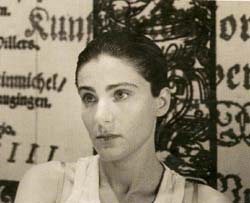by Jarrett Lyons
The experience of an emigre is an often misunderstood one. Sophia Romma, was born to an engineer father and a microbiologist mother in Russia. By the time she arrived in New York City in 1979 at the age of six, she was the daughter of parents whose resumes had expanded to gas station and deli owners and floor washers. The family came into a world where they were de facto communists and lost their professional titles. For many who travel, there is always a shock to their system when they begin a short stay in a foreign land. Imagine beginning an entire life in that frame of mind. For those who never experience the dichotomies of emigre life first hand, it is difficult to understand what the experience that effects them so profoundly. Romma dedicates her art to examining the opportunities forgone and the "doroga" or endless road taken in order to gain what America offers.
Seeking to understand similarities between emigres from all parts of the world when they leave their homeland, Romma began interviewing other "displaced human beings" last October. All interviewed came from very different backgrounds but were "performers" in one way or another, including athletes and theatre and film performers. She conducted eleven interviews with emigres running the gamut from a hopeful Nigerian boxer who felt unaccepted in Nigeria and also unaccepted here, to young women from Ukraine and Moldova who all wanted to perform to an orthodox Jew who wanted to be a drag queen. Taking these stories and performance aspirations into account, Romma sets these autobiographical stories to stage in "Cabaret Emigre."
"The play is set in a cabaret where people would say one thing and mean something entirely different, but are generally suffering entities who just want to belong, which is a very human condition," Romma explains.
Romma feels that a performer has an inherent need to express their emotions and to gain acceptance even if they accomplish this task through a role or character in order to make the process a bit easier. She herself writes plays because a playwright presents his or herself in every character they create. "A writer presents themselves through other vessels," she elaborates.
 |
| Sophia Romma |
To properly convey the sense of displacement felt amongst emigres Romma uses a distinct language in "Cabaret Emigre." The performers use a kind of abstract meta-dialogue. While quantum verse isn't entirely her terminology, the phrase was used as a way to describe her writing as a playwright in residence at the prestigious Mayakovsky Academic Art Theatre in Moscow. She cites a staccato beat to her verse that has been said to be both metaphysical and almost in a parallel style as a defining factor of her writing.
Quantum verse is used to highlight the disparity of those emigres who on some levels don't want to return to their homelands, those who do but are afraid to go back and those who don't know how to assimilate to American culture. This contradictory feeling, through Romma's artistic expression, breeds this "quantum verse."
Using her verse and the biographical accounts, Romma seeks to foster an understanding in her audiences. The audience becomes aware of the fact that while many of us are descendants of emigres, many Americans aren’t as quick to understand the sheer displacement that comes with experience of emigrating. They don't understand the experience of sacrificing so much yet not quite achieving the American Dream.
“I still to this day believe that America is the land of opportunity and certainly has been for me, but somehow Ms. Liberty springs a little bit of a leak.” She hopes to open eyes to “the deep trouble that faces all emigres from all walks of life, through generations.”
“A lot of plays have been written about immigration, because it’s what America is all about” she elaborates, but in the case of “Cabaret Emigre," the audience is brought into a Cabaret and entertained by the emigres who’ve told their tales and the tales of their parents and grandparents, receiving a first hand account of their background, getting a glimpse into a shtetl or a Nigerian home.
“Theater is a beautiful artform," Romma believes. "We can never let theatre die, it belongs to the audience, the performers and god and in that one moment nothing else existed. You can stop television, walk out of a movie theater. In a theater you're trapped in this seemingly endless Cabaret and for me that's magical."
